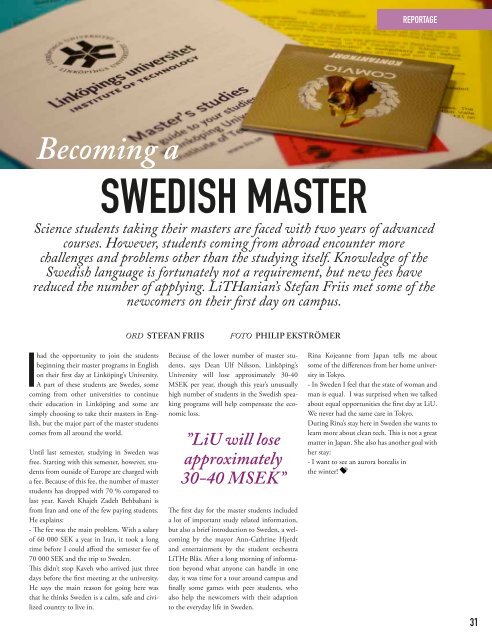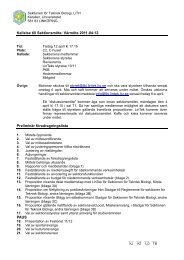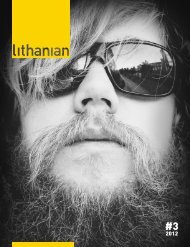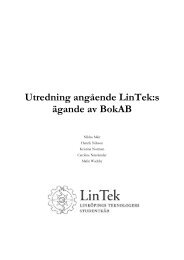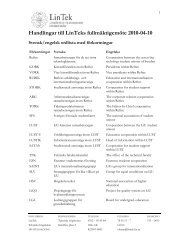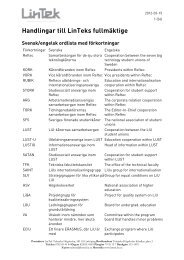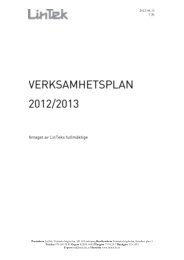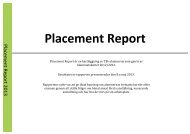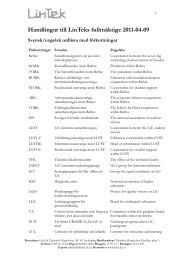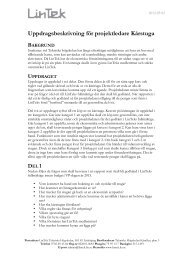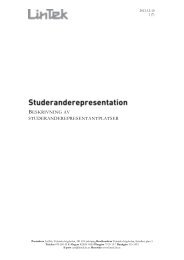You also want an ePaper? Increase the reach of your titles
YUMPU automatically turns print PDFs into web optimized ePapers that Google loves.
Becoming a<br />
SwediSh maSTer<br />
science students taking their masters are faced with two years of advanced<br />
courses. However, students coming from abroad encounter more<br />
challenges and problems other than the studying itself. Knowledge of the<br />
swedish language is fortunately not a requirement, but new fees have<br />
reduced the number of applying. litHanian’s stefan Friis met some of the<br />
newcomers on their first day on campus.<br />
i<br />
had the opportunity to join the students<br />
beginning their master programs in English<br />
on their first day at Linköping’s University.<br />
A part of these students are Swedes, some<br />
coming from other universities to continue<br />
their education in Linköping and some are<br />
simply choosing to take their masters in English,<br />
but the major part of the master students<br />
comes from all around the world.<br />
Until last semester, studying in Sweden was<br />
free. Starting with this semester, however, students<br />
from outside of Europe are charged with<br />
a fee. Because of this fee, the number of master<br />
students has dropped with 70 % compared to<br />
last year. Kaveh Khajeh Zadeh Behbahani is<br />
from Iran and one of the few paying students.<br />
He explains:<br />
- The fee was the main problem. With a salary<br />
of 60 000 SEK a year in Iran, it took a long<br />
time before I could afford the semester fee of<br />
70 000 SEK and the trip to Sweden.<br />
This didn’t stop Kaveh who arrived just three<br />
days before the first meeting at the university.<br />
He says the main reason for going here was<br />
that he thinks Sweden is a calm, safe and civilized<br />
country to live in.<br />
ord StEfaN friiS Foto PhiliP EkStrömEr<br />
Because of the lower number of master students,<br />
says Dean Ulf Nilsson, Linköping’s<br />
University will lose approximately 30-40<br />
MSEK per year, though this year’s unusually<br />
high number of students in the Swedish speaking<br />
programs will help compensate the economic<br />
loss.<br />
”LiU will lose<br />
approximately<br />
30-40 MSEK”<br />
The first day for the master students included<br />
a lot of important study related information,<br />
but also a brief introduction to Sweden, a welcoming<br />
by the mayor Ann-Cathrine Hjerdt<br />
and entertainment by the student orchestra<br />
LiTHe Blås. After a long morning of information<br />
beyond what anyone can handle in one<br />
day, it was time for a tour around campus and<br />
finally some games with peer students, who<br />
also help the newcomers with their adaption<br />
to the everyday life in Sweden.<br />
reporTage<br />
Rina Kojeanne from Japan tells me about<br />
some of the differences from her home university<br />
in Tokyo.<br />
- In Sweden I feel that the state of woman and<br />
man is equal. I was surprised when we talked<br />
about equal opportunities the first day at LiU.<br />
We never had the same care in Tokyo.<br />
During Rina’s stay here in Sweden she wants to<br />
learn more about clean tech. This is not a great<br />
matter in Japan. She also has another goal with<br />
her stay:<br />
- I want to see an aurora borealis in<br />
the winter!<br />
31


